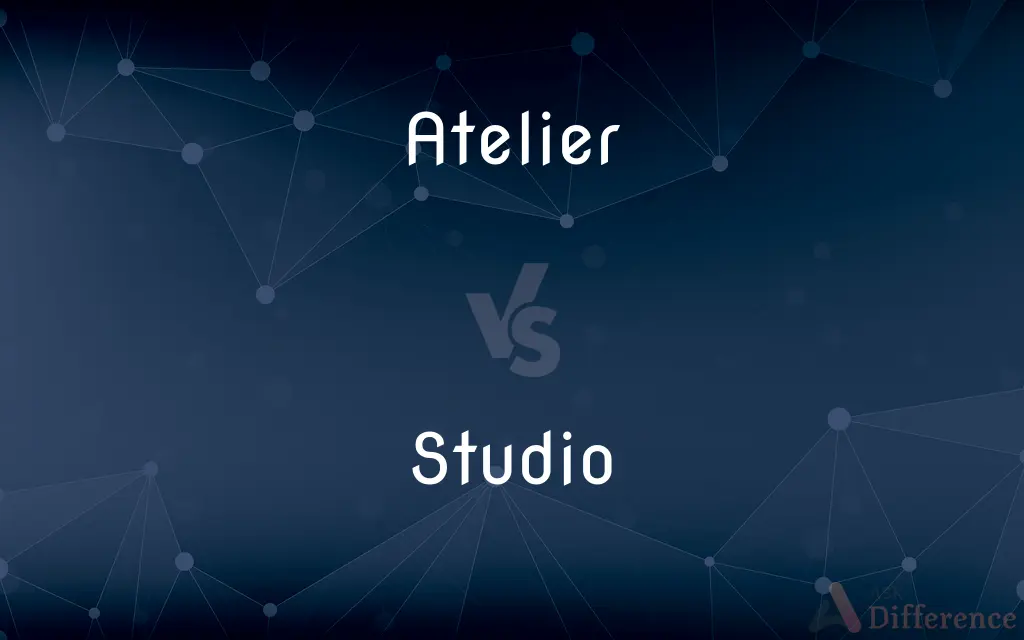Atelier vs. Studio — What's the Difference?
By Fiza Rafique & Maham Liaqat — Updated on March 25, 2024
Atelier refers to an artist's workshop, often emphasizing traditional craftsmanship, while a studio is a workspace for artists or professionals, highlighting versatility.

Difference Between Atelier and Studio
Table of Contents
ADVERTISEMENT
Key Differences
An atelier is traditionally seen as a space where artists, especially painters and sculptors, work and may mentor apprentices, focusing on fine arts and craftsmanship. This environment is often associated with a hands-on, classical approach to art. Studios, on the other hand, are versatile workspaces used by artists, photographers, dancers, and other professionals. They can be designed for various activities, including recording, rehearsing, or producing art, showcasing a broader application beyond just visual arts.
Ateliers typically have an atmosphere that fosters learning and mastery of artistic techniques, often through the apprenticeship model. This setting is conducive to detailed work and the development of a specific style or technique. Studios, whereas, are more about the individual artist's needs and may not necessarily focus on traditional skills or communal learning. They can be highly personalized spaces that accommodate the unique processes of the artist or creator.
The term "atelier" carries with it a sense of tradition and a direct lineage to the masters of art, suggesting a continuity of artistic practice and philosophy. It implies a dedication to the craft and often, a communal working environment. On the other hand, a studio might emphasize innovation, individualism, and the integration of modern technologies or interdisciplinary approaches to art and creativity.
In terms of physical layout, ateliers are often structured to facilitate classic art-making processes, with ample natural light for painting or sculpting. They may also be equipped for specific traditional techniques. Studios can vary widely in design, from soundproof rooms for musicians to open spaces with sprung floors for dancers or large, airy spaces for photographers, reflecting the diverse needs of their users.
Ateliers and studios both serve as inspirational and functional spaces for creators but differ in their historical roots, cultural connotations, and the nature of the work produced within them. An atelier is imbued with the ethos of artisanal heritage and mentorship, while a studio is a more neutral term that accommodates a wide range of creative activities and technological advancements.
ADVERTISEMENT
Comparison Chart
Primary Users
Painters, sculptors, and traditional artists
Artists, photographers, dancers, musicians
Focus
Traditional craftsmanship, fine arts
Versatility, various activities beyond visual arts
Learning Environment
Mentorship, apprenticeship model
Individual or collaborative without fixed structure
Cultural Connotation
Tradition, mastery of art
Innovation, individualism
Physical Layout
Designed for classic art-making, ample natural light
Varies widely, tailored to specific professional needs
Compare with Definitions
Atelier
A place where artists learn from a master artist.
The atelier provided an immersive environment for learning the nuances of sculpture.
Studio
A room or building for artistic work.
The photographer set up his latest shoot in the studio.
Atelier
A workshop or studio, especially for an artist or designer.
The painter spent most of his days in the atelier, perfecting his craft.
Studio
Flexible spaces designed according to an artist's needs.
The dance company rehearsed their new choreography in a spacious studio.
Atelier
Associated with craftsmanship and fine arts.
The atelier's reputation for excellence in craftsmanship attracted many aspiring artists.
Studio
A place equipped for particular artistic activities, like recording.
The band spent weeks in the studio recording their new album.
Atelier
An environment fostering traditional artistic techniques.
In her atelier, the artist uses centuries-old techniques to create timeless pieces.
Studio
Can be tailored for diverse professional activities.
The graphic designer's studio was filled with the latest digital art tools.
Atelier
A space for detailed work and development of specific styles.
The atelier's serene atmosphere was ideal for developing her unique painting style.
Studio
Reflects modern technologies and interdisciplinary approaches.
Her studio was a blend of traditional painting space and modern digital art equipment.
Atelier
An atelier (French: [atəlje]) is the private workshop or studio of a professional artist in the fine or decorative arts where a principal master and a number of assistants, students, and apprentices can work together producing fine art or visual art released under the master's name or supervision. Ateliers were the standard vocational practice for European artists from the Middle Ages to the 19th century, and common elsewhere in the world.
Studio
A studio is an artist or worker's workroom. This can be for the purpose of acting, architecture, painting, pottery (ceramics), sculpture, origami, woodworking, scrapbooking, photography, graphic design, filmmaking, animation, industrial design, radio or television production broadcasting or the making of music.
Atelier
A studio or workshop, especially for an artist, designer, or fashion house.
Studio
An artist's workroom.
Atelier
A workshop; a studio.
Studio
A photographer's establishment.
Atelier
A studio especially for an artist or designer
Studio
An establishment where an art is taught or studied
A dance studio.
Studio
A room, building, or group of buildings where movies, television shows, or radio programs are produced.
Studio
A room or building where tapes and records are produced.
Studio
A company that produces films.
Studio
A studio apartment.
Studio
An artist’s or photographer’s workshop or the room in which an artist works.
His studio was cramped when he began as an artist.
Studio
An establishment where an art is taught.
As he gained a reputation, he took larger space and took students into his studio,
Studio
A place where radio or television programs, records or films are made.
The recording studio had some slight echo, but was good enough to make a demo.
Studio
A company or organization that makes films, records or other artistic works.
The studios still make films, but they rely on the strength of their distribution.
Studio
A studio apartment.
It’s a lovely little studio with almost a river view.
Studio
The working room of an artist.
Studio
Workplace for the teaching or practice of an art;
She ran a dance studio
The music department provided studios for their students
You don't need a studio to make a passport photograph
Studio
An apartment with a living space and a bathroom and a small kitchen
Studio
Workplace consisting of a room or building where movies or television shows or radio programs are produced and recorded
Common Curiosities
How does an atelier differ from a typical art classroom?
An atelier offers a more immersive, mentorship-driven learning environment focused on mastering traditional artistic techniques, unlike the broader curriculum of a typical art classroom.
What kind of environment does an atelier provide?
An atelier provides an environment conducive to detailed work and the development of specific artistic styles, often with a focus on traditional techniques.
What is an atelier used for?
An atelier is used as a workshop or studio for artists, particularly in the fields of painting and sculpture, emphasizing traditional craftsmanship.
Is an atelier only for professional artists?
While ateliers are professional environments, they are also learning spaces for apprentices and students seeking to master their craft under the guidance of a master artist.
Can anyone open an atelier?
While traditionally associated with master artists, today, any artist committed to craftsmanship and mentorship can establish an atelier.
Can studios be used for collaborative projects?
Yes, studios are often designed to accommodate both individual and collaborative projects across various disciplines.
Do studios cater to specific art forms?
Studios can be specialized to cater to specific art forms, such as dance, photography, or music, with equipment and layout tailored to those needs.
What is the historical significance of ateliers?
Ateliers have historical significance as places where master artists trained apprentices, passing down techniques and traditions through generations.
Can a studio be used for activities other than art?
Yes, studios can be designed for a variety of professional activities, including music recording, dance rehearsals, and photography.
Are studios equipped with modern technology?
Many studios are equipped with modern technology to facilitate a wide range of creative and professional activities.
Can studios be home-based?
Yes, studios can be home-based, offering artists the convenience to work in a personalized and private space.
What makes a studio versatile?
The versatility of a studio lies in its ability to be customized for various creative and professional tasks, incorporating both traditional and modern techniques.
How do ateliers contribute to the artistic community?
Ateliers contribute by fostering a deep understanding of traditional arts, techniques, and mentorship, enriching the artistic community with skilled craftsmen and women.
How does the physical layout of an atelier support its purpose?
The layout of an atelier is often designed to maximize natural light and space for traditional art-making processes, supporting the craft's specific needs.
Why might an artist choose a studio over an atelier?
An artist might choose a studio for its flexibility, modern facilities, and the capacity to support a wide range of artistic or professional activities.
Share Your Discovery

Previous Comparison
Wined vs. Wind
Next Comparison
Keygen vs. VirusAuthor Spotlight
Written by
Fiza RafiqueFiza Rafique is a skilled content writer at AskDifference.com, where she meticulously refines and enhances written pieces. Drawing from her vast editorial expertise, Fiza ensures clarity, accuracy, and precision in every article. Passionate about language, she continually seeks to elevate the quality of content for readers worldwide.
Co-written by
Maham Liaqat















































